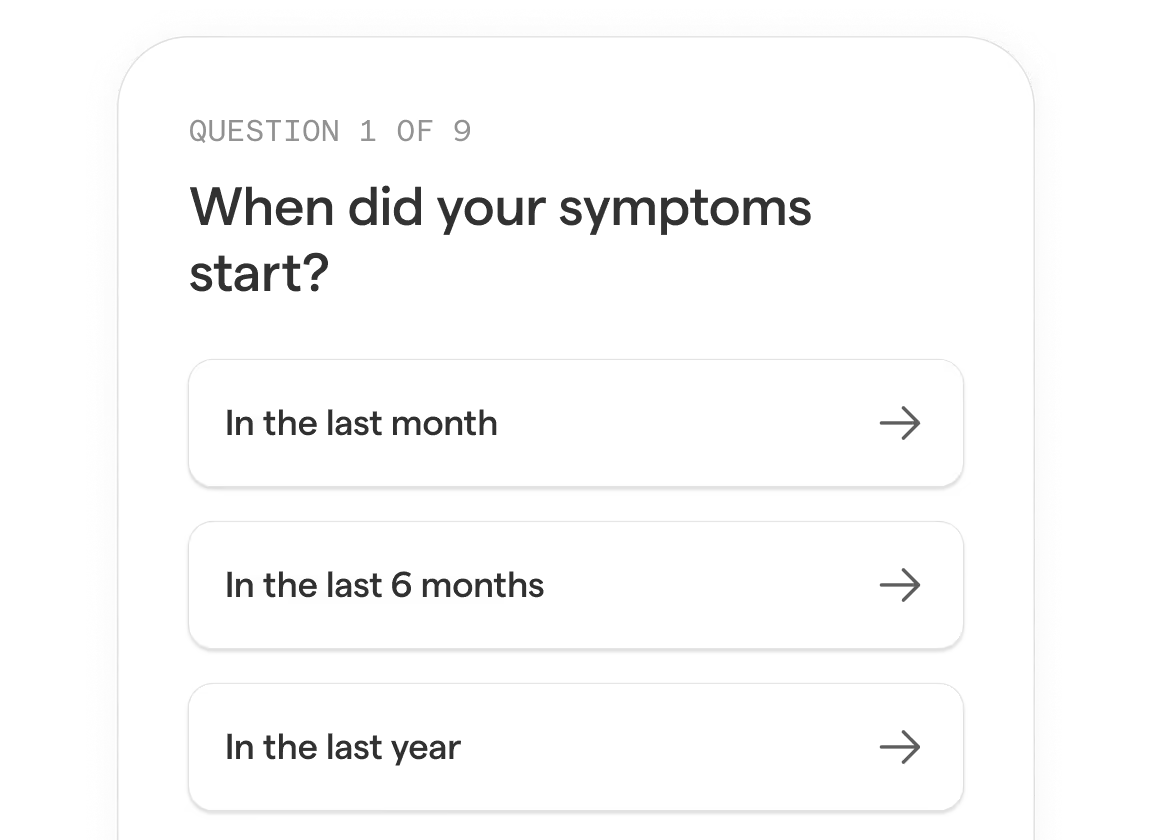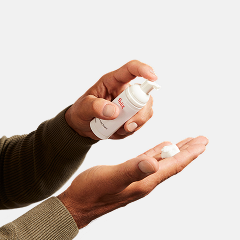Download the Felix App
Earn reward, visit our shop and get exclusive offers on the app
Download now

Through Felix, you can get Estradiol prescribed by a licensed healthcare practitioner with free delivery to your door.
Estradiol is used as part of Menopause Hormone Therapy (MHT), which used to be known as Hormone Replacement Therapy (HRT).
Estradiol is a replacement hormone used to treat women that are experiencing menopausal symptoms (i.e., hot flashes and night sweats, as well as dryness, itching or burning around the vagina).
In some cases, Estradiol is also used in combination with other treatments to help prevent osteoporosis that can develop due to low levels of estrogen, when combined with other important therapeutics (i.e., diet, calcium and vitamin D intake, smoking cessation, and regular physical weight bearing exercise).
For more resources, including a full list of the risks and benefits of Estradiol, please review the product monograph.
Estradiol contains 17β-estradiol, which is a replacement hormone that’s very similar to the natural estrogen hormone produced in the body of women.
Estradiol works by helping to reduce the severity of symptoms for both menopausal and postmenopausal women, by replacing some of the missing estrogen their bodies are no longer naturally producing.
Also, because it’s known that low estrogen levels can increase the risks of osteoporosis in women, taking Estradiol, in combination with other treatments, can reduce the risk of it occurring.
Estradiol has been indicated for two uses
The first use for Estradiol is as a method for managing menopause or postmenopause symptoms, which can be quite severe for some people.
The second use for Estradiol is as part of an ongoing treatment plan alongside other factors (i.e., proper diet, more calcium and vitamin D intake, regular exercise, quitting smoking), to reduce the risks of osteoporosis.
Estradiol tablets are to be taken orally, once per day, or as prescribed. To help the medication function most effectively, it’s important to take your dose of Estradiol around the same time each day.
Estradiol tablets can be taken with or without food, but should be swallowed whole. Don’t break, chew, or dissolve the tablets for use.
Follow the Estradiol dosing instructions given to you by your healthcare practitioner, and never take Estradiol at a higher dosage or more frequently than has been prescribed to you.
Some people may not experience side effects when taking Estradiol, or the side effects may diminish or vanish over time as their bodies get used to the medication.
Some side effects of Estradiol that can occur include:
If any of these side effects start to become severe, you should talk to your healthcare practitioner right away. They may be able to suggest an alternative Estradiol dosage or other medication that may work better for you.
MHT is the most effective treatment for menopausal symptoms and has been shown to prevent bone loss.
In menopausal women who start appropriately-dosed MHT prior to age 60 OR within 10 years of their last period, the health benefits outweigh the risks.
Risks of MHT are considered very rare (~1 case per 1000 to 10,000 women on MHT per year) and may include:
- risks of stroke or blood clots in legs or lungs with oral estrogen (much lower risk with estrogen gel or patch)
- risks of dementia in women older than 65 years,
- risk of breast cancer (less than ~1 case per 1000 women on MHT per year)
These conditions are all rare, but they highlight the importance of having a full discussion with your healthcare practitioner; especially if you’re experiencing moderate to severe side effects.
Individualization is key, and your MHT treatment plan should be reassessed (at least) once a year to monitor your health, as well as ensure that you are on the correct dosage and formulation. Your practitioner can help you find balance between treating your symptoms safely, and avoiding increased risks.
There are a number of people that shouldn’t take Estradiol, including:
In addition to these people, there are others that should be extra cautious about taking Estradiol, as it could have negative side effects. These include:
If you believe any of these conditions apply to you, then you should talk to your healthcare practitioner. They may be able to suggest alternative Estradiol dosages or other medications that could work better for you.
Further reading








Felix is Canada’s first truly integrated healthcare platform. We provide on-demand treatment for everyday health needs like weight loss, mental health, sexual health, and more. Founded in 2019, our digital-first approach to healthcare includes everything from diagnosis to prescription — all accessible from the comfort of home.
No. Felix provides a faster, hassle-free way for you to get a treatment plan for certain conditions, but our service does not replace your primary care provider. For matters that extend beyond obtaining a lifestyle treatment safely and easily, we encourage you to consult your primary health practitioner in person — whether for checkups, personal health concerns, or to inform them about your current treatments or treatment plans.
Absolutely. Our online assessments have been designed to ask all the necessary questions required for diagnosis. We've worked with specialists to create an assessment process that can provide sufficient information for the healthcare practitioner to determine whether or not you are eligible for a prescription and craft an appropriate treatment plan.
Call 911 or proceed to your nearest emergency room immediately. Felix is not intended for medical emergencies. Once the emergency has been addressed or resolved, contact your prescribing practitioner to inform them of your experience as this may impact your current treatment plan.
Anyone who is 18 years or older (16 or older for acne and birth control prescriptions), and is located in Alberta, British Columbia, Manitoba, Newfoundland and Labrador, Nova Scotia, Prince Edward Island, Saskatchewan or Ontario. We cannot ship treatments outside of these provinces at this time.
After creating an account, you will complete a medical assessment for evaluation by one of the Felix healthcare practitioners.
During your assessment, you will have the opportunity to send your practitioner questions via secure messaging.
In most cases, practitioners will complete your assessment with secure messaging alone but sometimes they may determine you require an audio or video visit and/or further diagnostic testing to help determine the best treatment plan for you.
If your practitioner has determined a prescription treatment is appropriate, they will approve your visit and write you a prescription. Our pharmacy will then ship your prescription to your home.
You’ll be able to message your healthcare practitioner if you have questions or want to make changes to your treatment at any time.
No. We use an asynchronous telemedicine model so you can complete your online visit in your own time and we save your progress so you can come back later to finish it.
If you are completing a visit in the mental health or weight loss categories, your healthcare practitioner may require a phone or video call to discuss your medical profile further during the assessment process.
Most assessments do not require a phone or video conversation. Once a prescriber has reviewed the info in your assessment they will respond to you via secure instant messages that you can access within your Felix account.
If you are completing a visit in the mental health or weight loss categories, your healthcare practitioner may require a phone or video call to discuss your medical profile further during the assessment process.
You can expect to receive a response from a healthcare practitioner within 24 hours of submission. If you’ve been waiting longer than this, please reach out to our Patient Support team through the chat bubble in the bottom right corner of your account or our Contact Us page.
No. A visit with a licensed healthcare practitioner is required for all treatments currently provided through Felix’s service.
Not long. After completing your assessment, a practitioner will generally respond within 24 hours, and often much sooner.
Treatment plans will be processed within 2-4 business days of your approval date if there is nothing blocking fulfillment.
All packages usually takes 2-3 business days. You will receive an email with your tracking number once your treatment has been shipped.
Absolutely. All Felix shipments arrive in a nondescript blister package so you can have your treatment shipped wherever makes sense for you as long as there is someone there to sign for it.
A signature upon delivery may be required.
There is currently no cost to have your treatment shipped to you from our Felix Pharmacy network.
Yes, your security is paramount to Felix’s mission. Personal health information provided during your medical assessment is strictly and legally confidential between you and the Felix healthcare practitioner.
Beyond that, all your account information (including the medical assessment, credit card, and shipping information, etc.) is also stored safely and securely. Felix is compliant with all federal and provincial health privacy legislation. It is our duty to protect your data with comprehensive security infrastructure and stringent data policies to ensure it stays private and secure.
Read more on our Privacy Policy.
Yes! In Canada, only a licensed healthcare practitioner can write a prescription, and only a registered pharmacist can fill that prescription. We are supported by leaders in the Canadian pharmacology and specialized medical fields. Felix adheres strictly to all the regulations set forth by all applicable Colleges of Pharmacists and Colleges of Physicians and Surgeons in which we operate.
Absolutely. All prescriptions obtained via Felix are provided by licensed Canadian healthcare practitioners—the same as you would get at a hospital, doctor’s office, or clinic. These practitioners do not provide prescriptions unless they deem it medically safe and appropriate to write them based on your medical profile and assessment answers. Our assessments have been crafted by the practitioners on our medical team. Finally, all Felix Pharmacies are provincially accredited just like any retail pharmacy.
Your privacy is our top priority. All your data is 256 bit SSL/TLS encrypted, and we take significant steps to keep your data secure. You can read our Privacy Policy for more information.
Felix charges a fee for the online visit. In most cases the fee is $40 but varies by treatment category. The visit fee includes a prescription valid for up to a year (depending on the condition) and on-going support from the healthcare practitioner or pharmacist.
It depends. Treatment costs vary but will be in line with what you would pay at a pharmacy in person. You will see the estimated cost of your treatment before insurance, during the online visit but will only be billed for medication costs for your prescription once it is approved and sent to our pharmacy. Once approved, your treatment and payment will be processed within one to two days.
Keep in mind that you won’t necessarily need to pay the full price yourself. If you have insurance, Felix’s partner pharmacies will bill your insurer directly. You may also be eligible for financial support in your province.
We accept all major credit cards for any aspect of your treatment not covered by insurance or other financial support
Treatment coverage varies greatly between different insurance plans.
The good news is that if you are covered, Felix can bill your insurer directly, and then process your treatment plan at no additional cost to you. We recommend that you upload your private and/or provincial benefit card during the online visit so that our pharmacy partner can apply any coverage you are eligible for before processing your treatment plan.
Insurance coverage for treatment plans through Felix doesn't include the cost of your visit.
A Felix online visit is considered asynchronous since it is conveniently completed through a secure chat bases system. Currently, asynchronous visits are not covered by insurance or provincial health plans so you will be charged a visit fee, depending on the category of treatment you are requesting.
Medication coverage varies greatly between different plans, provinces, and has specific criteria that determine eligibility. For private insurance, we recommend contacting your benefits administrator with your details and the Drug Identification Number (DIN) and the drug name to determine your coverage.
For more details on provincial health plan coverage see below:
Alberta: Learn more about AHCIP here. Search for covered drugs here.
British Columbia: Learn more about MSP here. Search for covered drugs here.
Manitoba: Learn more about MHSIP here. Search for covered drugs here.
Newfoundland and Labrador: Learn more about MCP here. Search for covered drugs here.
Nova Scotia: Learn more about MSI here. Search for covered drugs here.
Ontario: Learn more about OHIP+ here. Search for covered drugs here.
Prince Edward Island: Learn more about Health PEI here. Search for covered drugs here.
Saskatchewan: Learn more about Saskatchewan Health Coverage here. Search for covered drugs here.












